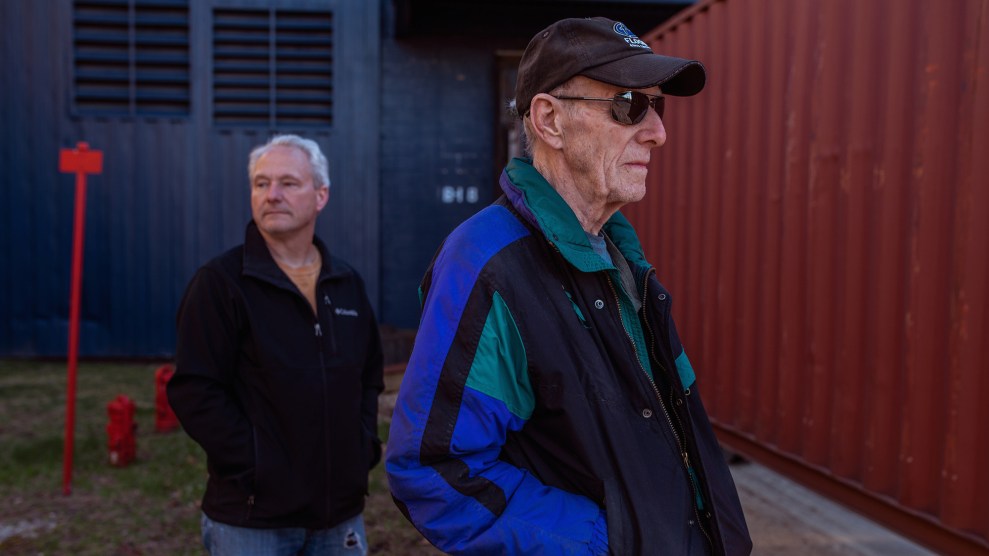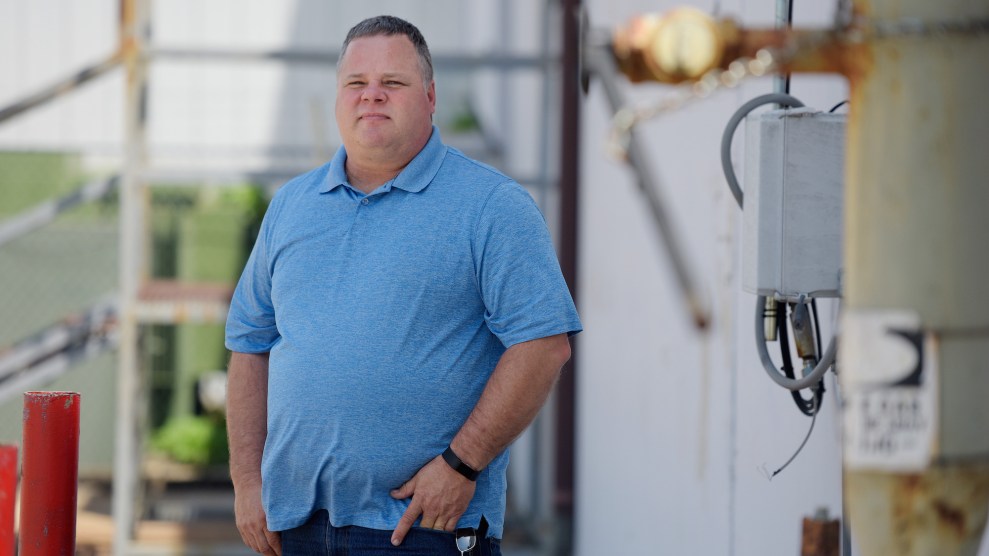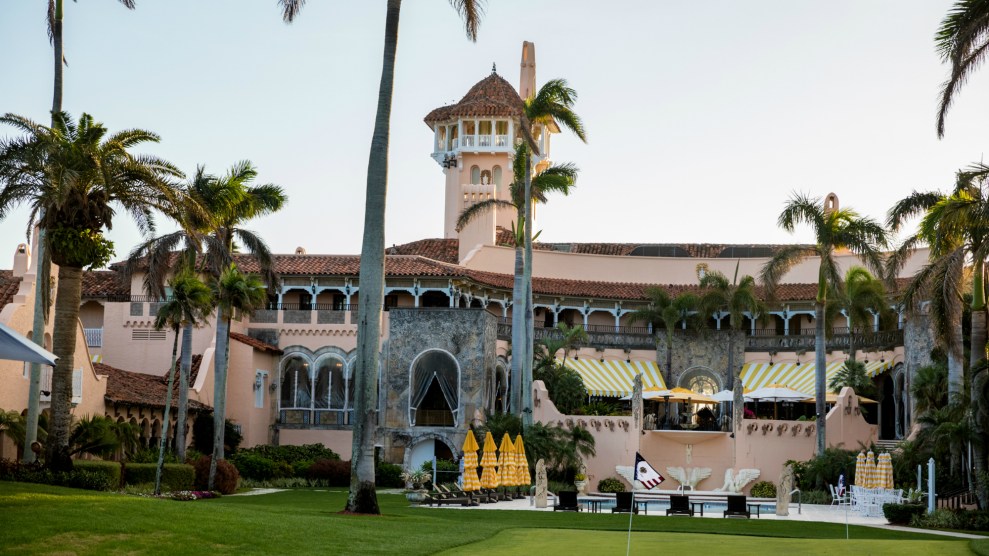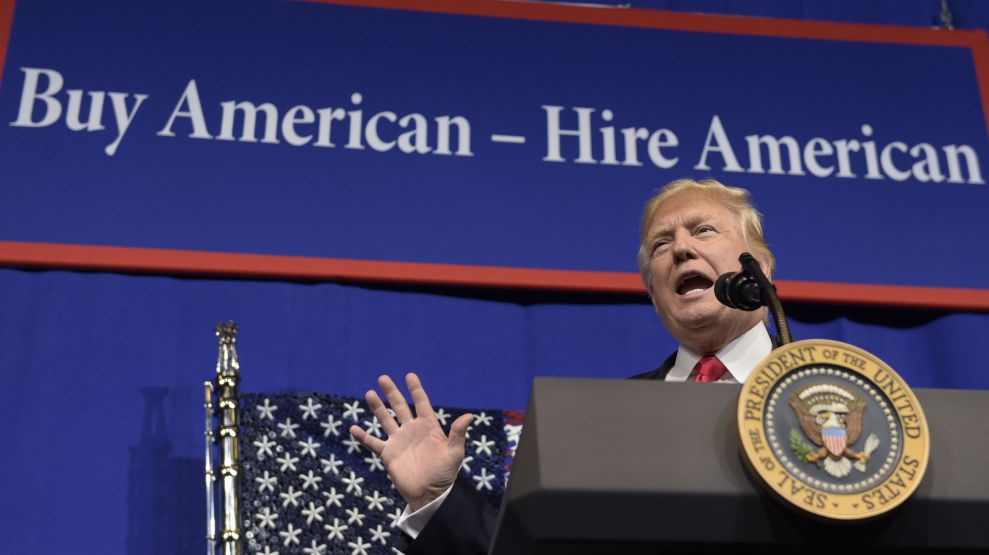
Tom Kiefer Jr., 51, a toolmaker, lost his job of 21 years when the Leviton factory in Warwick, Rhode Island closed. Steven G. Smith/ProPublica
This story was originally co-published by The Atlantic and ProPublica.
Two weeks before the presidential election, Donald Trump flew into a faded textile town in North Carolina and riled up the crowd over one of his campaign’s signature promises: bringing back the jobs that businesses had shipped overseas.
“They wouldn’t be doing it if I was president,” Trump said to cheers. “Believe me, when they say, ‘We want to send our product’—whatever the hell they make—‘We want to send our product back into the United States,’ I’d say, ‘We’d love to have your product—35 percent tax. Let’s see if you move.’”
He ticked off a list of companies that had closed factories in the state, calling attention to Leviton Manufacturing, a maker of light switches and electrical outlets found in homes and offices around the world, including Trump’s real-estate properties.
“I buy a lot of Leviton switches,” Trump said. “I’m not buying ’em anymore.”
Fast-forward 18 months. Leviton now stands to benefit from a bill that would eliminate the taxes the company pays to import an outlet it makes in China—not, as Trump vowed, raise them.
The bill’s supporters say it will get rid of punishing tariffs on raw materials and components that are critical to American manufacturing. But that’s not all it does. Tucked into the legislation are tariff waivers like the one Leviton requested, which exempt hundreds of finished consumer products—from microwaves to pillows to fishing rods—that used to be made in America.
Leviton qualified through a little-known provision that allows for waivers on finished products so long as there are no competing U.S. manufacturers. But Leviton wasn’t required to disclose that one of the reasons the outlets are no longer made in America is that the company shutdown four U.S. factories between 2005 and 2013, laying off more than 1,000 workers and shifting the work to Mexico and China.
“The whole thing kind of stinks,” said Tom Kiefer, a toolmaker who lost his job of 21 years when the company’s Warwick, Rhode Island, factory closed. “It’s not made here because they sent it to China.”
The legislation, known as the Miscellaneous Tariff Bill Act, is emblematic of the contradiction at the heart of the country’s trade policy: Congressional Republicans and many Democrats who support the bill want to ease the tariff burden on corporations — no matter where they make their products — even as the Republican president promises to punish companies that don’t manufacture in the U.S.
The Trump administration has not commented publicly on the bill, which passed the House in January and is awaiting approval by the Senate. His aides have so far sent mixed signals, sending a letter to congressional staff expressing concerns only to later withdraw it. Their reticence runs contrary to the president’s very vocal opinions about trade. Trump resurrected the issue from a policy backwater and has shaken the global economic order this year with new tariffs on solar panels, washing machines, steel and aluminum. Taking aim at China, he recently threatened to slap tariffs on hundreds of its exports in retaliation for the country’s technology policies.
For now, the policy split in Washington means that later this spring, around the same time that Trump could impose tariffs on hundreds of products from China, Congress is expected to hand him a bill asking him to do the exact opposite — reduce or eliminate import taxes on finished products, including more than 400 from China.
Here’s just one bewildering example: The current bill would lower tariffs on electric delivery vans from China just nine years after the Obama administration spent billions of dollars to try to build an electric-vehicle industry in the United States. Meanwhile, Trump’s top trade representative has specifically—and publicly—vowed to raise import fees on China’s electric vehicles.
Many companies, including Leviton, are effectively asking for tax breaks on the same products that they used to make domestically, but that are now made overseas. Granting companies such waivers amounts to a reward for shifting jobs to other countries, some workers and U.S. manufacturers say, and only encourages others to follow.
To find companies seeking tax breaks after closing U.S. factories, ProPublica compared the 1,662 waiver requests in the bill to Labor Department data on workers who’ve lost their jobs due to international trade. The analysis found that the companies requesting waivers on finished goods have eliminated an estimated 175,000 jobs due to outsourcing and competition from foreign imports since 1975, when the Labor Department began keeping track. Measuring it a different way, the industries impacted by the bill have especially seen manufacturing leave the U.S.—with more than 150,000 jobs lost in the last decade alone.
Among those pressing the government to lower the tariffs on their foreign-produced goods are a slate of corporations many consumers view as quintessentially American. Whirlpool, Caterpillar, PetSmart and the Gap all submitted petitions to the U.S. International Trade Commission, saying the import taxes on certain kitchen appliances, clothing, pet supplies and equipment are unnecessary, even if they used to be made domestically.
The fitness-equipment company Nautilus, for example, is seeking waivers for its Bowflex TreadClimber and other cardio machines, which it now imports from China. In 2008, Nautilus closed the Tulsa, Oklahoma, factory where it used to make these machines, laid off 150 people and moved production to China and Taiwan.
The cosmetics manufacturer Revlon closed its tweezer and nail-clipper factory in Irvington, New Jersey, in 2007 after 50 years. Now, it’s asking Congress to drop the duties it pays to import tweezers, nail clippers and manicure/pedicure sets from China and South Korea.
“The whole idea of miscellaneous tariff bills is the bill should be for U.S. manufacturing—not retailers and importers,” said Democratic Senator Sherrod Brown of Ohio. “The exemptions here have really undermined the intent of Congress. Congress needs to look at this again.”
In 2012, Rubbermaid left Wooster, Ohio, the town where it was founded 90 years before and formerly manufactured many products. Now, the company wants tariffs lifted on plastic lids for food containers made in China and Malaysia. (A Revlon representative said the “majority of functions” performed in New Jersey moved to North Carolina and that its application for tariff relief complied with the law. Neither Nautilus nor Rubbermaid responded to calls or emails about their waiver applications.)
Supporters of the consumer-product waivers in the bill say it helps U.S. companies stay in business, even if they’ve moved parts of their operations to another country. “Everybody wants to make trade the boogeyman,” said Nicole Bivens Collinson, a lobbyist and former trade negotiator whose firm handled several requests. “Many times, it’s only because companies have been able to source some goods overseas that they’ve been able to maintain U.S. manufacturing.”
The National Association of Manufacturers, which has been the biggest proponent of the bill, declined to comment. But in a blog post, it defended the inclusion of finished products, saying that eliminating the tariffs would lower prices for American consumers. Other supporters note that the waivers last only three years and the rules cap the government’s financial loss on any one item.
While those claims are true, lifting those tariffs can still mean big tax breaks for some companies. For example, Bayer, the German pharmaceutical and agricultural company, requested suspensions on more than 100 products in the bill, including aspirin. That means that it and other importers of those products would see $100 million in savings over three years—more than a third of it on items Bayer described as finished products, a ProPublica analysis found. Amazon didn’t request any waivers itself, but is listed as a likely beneficiary on $50 million worth of tariff reductions because it also imports the items.
Some small manufacturers have objected to their competitors’ waiver requests, saying they still make the products in the United States. Others, like the trade association for U.S. textile manufacturers, have argued that including finished products weakens the U.S. negotiating position by lowering trade barriers with other countries without concessions, such as requiring countries to open up their markets or raise their labor and environmental standards.
For Leviton, moving production overseas was perhaps an inevitable transition for a 112-year-old company whose timeline intertwines with America’s industrial history. The company took off by manufacturing a lamp holder for Thomas Edison’s light bulb and later made beaded chains for the dog tags soldiers wore in World War II.
Leviton declined to make executives available for interviews or to answer specific questions. In a statement, it said, “We are committed to doing all we can to keep jobs here in the U.S. and only operate elsewhere to remain competitive, protect our overall business and serve the best interest of our customers.”
When Leviton shut down its factory in Warwick, it left a hole—which turned into a literal one. A few years after the company left town, a developer demolished the iconic 19th century redbrick mill that housed Leviton’s main building. The company had been there since 1939 and many workers could count several generations of relatives who had passed through.

Many former Leviton workers can count several generations of their families who once worked at the factory.
Steven G. Smith / ProPublica
“You had whole families working there,” Kiefer said. His father worked as a mechanic for nearly 50 years until the warehouse closed in 2010. When his father was out with a back injury, his mother took his place, working “mother hours” so she could see the kids off to school and be home when they returned. Kiefer’s sister worked there. So did his brother-in-law, an aunt and two uncles.
Before Trump turned tariffs into a cudgel, they served various purposes, first generating revenue for the federal government before the income-tax system and later protecting domestic industries from foreign competition. Generally, unless a country is part of a separate free-trade agreement like the North American Free Trade Agreement, importers must pay a tax on products and materials they bring into the United States.
The current fees were set through various international negotiations over the past few decades that left U.S. tariffs relatively low compared with those of other countries. In exchange, American companies are able to sell their products overseas, even if they have to pay a higher tariff to do so. As a side benefit, leaders often hope that war is less likely among countries that do business together.
Many Americans blame low trade barriers for the loss of blue-collar jobs, but there is competing evidence. Light trucks, which have far higher tariffs than cars, are mostly made in North America. But high import taxes on sneakers have done little to prevent footwear companies from manufacturing in Asia.
Miscellaneous tariff bills were designed decades ago to help American manufacturers compete against foreign companies by dropping fees on imported chemicals, minerals and other necessary components that weren’t available domestically. But as global trade grew in the late 1990s and 2000s, the bills began to include finished consumer products that had no U.S. competitors.
About 750 of the 1,662 products included in the current bill are identified as finished goods, a ProPublica analysis found. (The National Association of Manufacturers says that only about 400 are finished products but declined to explain its numbers.) As recently as 2004, similar tariff bills contained only a few dozen.
Past bills granted waivers more informally. Companies and industry groups simply submitted requests to members of Congress, who reviewed them with government experts and inserted them into trade bills. But after House Republicans adopted a ban on earmarks in 2010, some lawmakers worried that the process could be seen as doling out special favors. As a result, a renewal of past tariff suspensions languished and no new ones were granted, costing businesses $750 million a year, according to the manufacturers’ association.
In 2016, Congress created a more transparent system, requiring companies to file petitions with the International Trade Commission, an independent federal agency that provides expertise on trade to legislators and policymakers. The commission reviews the requests and makes recommendations to Congress, based in part on whether there is any relevant domestic manufacturing.
Many companies fit the original legislative intent of easing taxes on foreign components that are critical to manufacturing final products in the U.S. Lasko Products of Pennsylvania, for example, is the last remaining U.S. manufacturer of electric pedestal and desktop fans, but it imports the fans’ motors from China.
At a congressional hearing last fall, the company’s chief operating officer, Ed McAssey, said Lasko employs 638 workers who assemble the fans at its factories in Tennessee and Texas, earning an average of $16 an hour. The company used to make the motors domestically but couldn’t compete with cheaper foreign manufacturers. The tariff relief, McAssey said, “enables us to compete with suppliers in China who do not incur the costs of livable wages, health insurance and retirement contributions that we provide our employees.”
The bill’s supporters often trot out such textbook examples of small to midsize U.S. manufacturers that waivers help to compete. But they rarely mention the multinational corporations like Mattel—or retailers, such as the Home Shopping Network—that are also seeking tariff breaks on products that require no American manufacturing.
Inside the 500-page bill are tariff reductions for hundreds of such items: baby strollers, hiking boots, pimiento-stuffed olives, boxing gloves, coffee makers, toasters, plastic spoons and forks, sparklers and party poppers, nicotine gum, pet toys, pajamas, reusable grocery bags, leather belts, sweaters, glass vases, basketballs, unicycles, yoga mats and vertical waffle makers.
“This is not what I ever thought the miscellaneous tariff bills were intended to do,” said Jennifer Hillman, a Georgetown University professor who worked on past bills as a Democratic congressional aide and served on the trade commission. “It’s supposed to benefit domestic companies that are manufacturing in the United States.”
Dan Ikenson of the libertarian Cato Institute, however, said that there’s good reason to get rid of tariffs on finished products as well as component parts.
“You see an old textile mill in South Carolina with a rusty gate and a rusty chain around it and you see the blight in the town, you think this is the cost of trade liberalization,” Ikenson said. But what’s not seen, he said, are the jobs created by the extra money people have to spend because they pay less for imported clothes.
Indeed, in supporting the waiver requests, companies made little attempt to justify them as creating American manufacturing jobs. For its request to eliminate import fees on microwaves, Whirlpool wrote, “This product supports U.S. marketing and distribution jobs and complements U.S.-assembled cooking products.” When the owner of Ann Taylor stores requested a tariff suspension for women’s hats, the headwear company Dorfman Pacific submitted a public comment in support, noting that “hats offer an extra layer of protection against skin cancer and premature aging.”
The International Trade Commission did reject hundreds of requests from companies to include products in the bill after finding that doing so would harm U.S. manufacturers. And Congress culled the list further, removing items such as air conditioners, which would have been controversial after Trump made a big deal of stopping Carrier Corporation from moving a factory to Mexico.
But whether the companies’ decisions to close their own factories helped them qualify for the waivers was not part of the review—or perhaps even known to lawmakers.
ProPublica analyzed the trade commission’s database of approved requests against data from the Labor Department’s Trade Adjustment Assistance program, which provides financial help and job training to workers who lose their jobs due to increased foreign imports and outsourcing. In calculating job losses, ProPublica excluded companies seeking waivers for components and focused solely on finished products. Because the trade database identifies products while the labor data uses industries, it’s not clear in every case if workers were making the exact same products or only similar products. But through additional reporting, several companies stood out.
Nautilus’ factory in Tulsa got its start churning out StairMasters during the fitness craze of the 1980s. The company had bought StairMaster out of bankruptcy, and by 2007, it appeared stable. The local press reported that business was so good that Nautilus was adding an assembly line and even bringing back jobs from overseas.
But just over a year later, Nautilus announced it was closing the factory. According to Labor Department records, 178 workers were affected as the company shifted some production to China and Taiwan. At the time, many companies still made fitness equipment in the U.S. But the trade-assistance data shows a cascade of layoffs followed Nautilus’ decision, as other companies like Core Industries and Icon Health & Fitness also closed their factories, affecting an additional 2,000 workers.
Rick Haselton, who helped design the TreadClimber, on which Nautilus is now seeking lower tariffs, said companies should face a penalty for moving manufacturing outside the U.S. “It helps them do their job a little cheaper,” he said. “But all these jobs like I was in—that was what I depended on. That was my bread and butter, my livelihood.”

Rick Haselton was on the team that helped design the TreadClimber for the Nautilus fitness company before it closed its Tulsa, Oklahoma, factory in 2008.
Brandi Simons / ProPublica
The bill also seems to sacrifice high-tech manufacturing like electric vehicles. In 2010, Smith Electric Vehicles received a $30 million federal stimulus grant to build battery-powered trucks in Kansas City, Missouri. At the time, then-President Barack Obama toured the factory, telling workers they were “building the economy of America’s future.” But Smith suspended production at the end of 2013 and, in 2015, formed a joint venture with Chinese investors called Nohm.
The company has asked Congress to eliminate the 25 percent tariff on electric commercial vehicles like the ones it makes in China. The trade commission approved the petition but balked at a full waiver, agreeing to only slightly reduce the duties. (No one at the company, which is now called Chanje, returned calls or emails seeking comment.)
Lawmakers asked almost no questions about the finished products included in the bill at a sparsely attended congressional hearing last fall. Representative Ron Kind, a Democrat from Wisconsin, summed up the mood in the room when he said, “This is kind of a boring hearing because it’s not that controversial.”
The bill passed the full House 402-0. It was widely expected to be attached to the omnibus spending bill that passed Congress in March, but was left out as the Trump administration expressed concern about the number of imports from China.
Republican and Democratic congressional aides said the bill is still moving forward, as senators work through some of the line items.
Brown, for example, said in an interview that he managed to remove electric vehicles from the Senate version of the bill, but the amendments have not yet been made public.
When Tom Kiefer walked into the Leviton factory shortly after graduating high school in 1984, the plant hummed with 1,800 workers, many of them with little advanced education, assembling electrical outlets, light switches and lamp holders largely by hand.
He joined an apprenticeship program training new hires as toolmakers to help design the machines that would eventually automate most of the lines. At the time, the business manager of the union local had a slogan: “Automation is our salvation.”
But in the late 1980s, a few years before NAFTA was signed, Leviton opened a factory in Tijuana, Mexico.
“That’s when they started sending stuff to Mexico,” said Kiefer, 51, as he sat near the carousel in the Warwick Mall food court with his father, Tom Kiefer Sr., and another former toolmaker, Nick Izzi, at the end of March.
“When we were building the automated machines, they were sending them out one at a time,” said Izzi, 55, “making us think that they were just sending them to the other plants.”
Ground-fault circuit interrupters, or GFCI outlets, on which Leviton requested the tariff waivers, were particularly labor-intensive. They’re the kind of electrical outlets found in bathrooms and kitchens that are designed to shut off if the current comes into contact with water. The outlets were made in Warwick for a while but eventually made their way to Leviton’s factory in Dongguan, China.
Kiefer Jr. and his wife were having an inspection on their new house the day that the bosses announced they were closing the plant in 2005.
After three months out of work, he took another machinist job for $5 an hour less than the $21 an hour he made at Leviton. Still, he felt lucky. Other workers ended up at Walmart or as janitors at the local hospital.
“Before the end,” Izzi said, “we even had the Mexicans come and watch us build them so that they could build them themselves.”
“They came in and they were actually complaining that Leviton was moving all the production they were making over to China,” Kiefer Jr. said. “We were like, ‘Well, now you know how we feel.’”
After the Warwick factory closed, Leviton closed two plants in western North Carolina in 2008 and 2009 and a factory in El Paso in 2013. The company said in a statement that it still has thousands of employees in the U.S., but declined to say how many work in manufacturing.
“Most people, even though they hated it when they worked there, there was no place like that,” Kiefer Jr. said.
“I think half of Rhode Island worked there at one time or another,” said Kiefer Sr., 78, cradling a plastic-foam cup of coffee.
Sure enough, as they talked amid the mall’s afternoon crowds, a few former Leviton workers or their relatives happened by.
One was Rui Carrinho, the longtime union leader at the plant. Talk turned to Leviton’s request to get rid of the tariffs.
“That’s the government giving them an incentive to move the jobs abroad,” Carrinho said.
But even if Leviton doesn’t get the waivers on the outlets now, because of a technology trade agreement signed in 2015, the tariffs on them are due to phase out within the next five years.
“To me, it’s just frustrating because the state, they’re looking for all these high-tech jobs—a lot of people can’t do those kind of jobs,” Kiefer Jr. said. “They want manufacturing that people who can work with their hands can do. But there’s not a lot of jobs like that anymore.”
ProPublica is a Pulitzer Prize-winning investigative newsroom. Sign up for their newsletter.
















